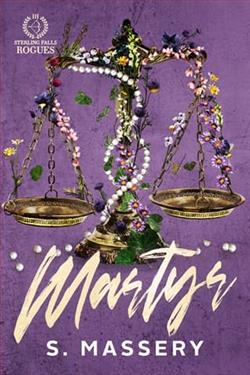Page 24 of Last Letter Home
She opened a cupboard on the wall behind her, and selected one of the sets of keys that hung there. ‘Take the narrow drive past the house that way’ – she gestured – ‘follow it round and you’ll see the cottage to your right, past the long wall. All the instructions are in a file on the kitchen table. Everything’s ready, but if there is anything I can help you with do give me a call. Take care now.’
Driving down between the right-hand side of the house and a long high brick wall, Briony eventually found a Victorian cottage set in a sunny spot. She stared at the house in delight. It was two-storeyed, built of ochre brick, dark with age. Pointed, white-edged gables sheltered hatched windows and a shallow porch. It was like the gingerbread house out of Hansel and Gretel. What an enchanting place to stay in for a fortnight.
The email had arrived two weeks after her return from Italy. Luke’s Dad, Roger, sounded a bit of a character: ‘A lady in my wife’s book club knows of a cottage in the grounds of an old manor house a few miles hence, where her apparently rather charming daughter works. The last tenant has recently quitted the cottage and the owner wants to give it a lick of paint before re-letting, but as this isn’t a priority it appears you can stay there for a bit, if you don’t mind a bit of dust (and no doubt a few ghosts!).’
Now, Briony walked the short, flower-bordered path to the stout oak front door. Inside, a compact hallway gave way to a chintzy sitting room to the left, a thankfully modern kitchen to the back and, at the right-hand side of the narrow staircase, a door which opened into a small dining room, rather crowded with a glass-fronted dresser, matching table and chairs and a heavy sideboard; gloomy remnants of a more formal age that valued best glass and dinner services as signs of status. Still, the table would be a good place for her to lay out her papers, and a wifi hub winked from a corner.
The house felt so recently inhabited, with cleaning materials, spice jars and new celebrity gossip magazines stacked on shelves, that she fancied she was intruding. Mounting the stairs, she found two small bedrooms, the double bed in the bigger one made up ready for her arrival. The bathroom needed updating, for the wallpaper bubbled in places and her nose wrinkled at a lingering smell of damp. At least there was a shower over the worn bath. She’d seen worse, she decided, remembering the grubby shared bathroom in the overcrowded house where she’d dossed once with Aruna as a student in London.
After she’d hauled her case up to the bedroom she paused to look out of the window. It was high enough here to see over the long brick wall into a garden beyond, but she was disappointed not to see any burgeoning flower beds, only a dozen neat geometric shapes of cropped grass divided from one another by gravel paths. It was like a tiny park with a bench or two. On one sat an elderly man, wrapped in a coat and trilby hat despite the warmth of the day. He was sitting, lost in thought, walking stick in hand. It was too far away to see the expression on his face, but he seemed peaceful enough. It was a sunny place to sit.
It must be the old kitchen garden, the walls providing protection for the plants from the elements, Briony thought as she returned to the car to fetch the rest of her luggage. Hadn’t there been something about it in Sarah Bailey’s letters? Whoever Sarah had been, Briony would be walking in her footsteps. As she carried in the canvas tote bag containing Sarah’s letters and her grandfather’s box, she experienced the strange sense that the past was here all around, if only she could reach out and draw back the veil.
Thirteen
March 1939
A wild wind blew in from the north, ‘straight from Siberia’, as Mrs Allman the cook remarked, but Sarah stepped out into the garden of Flint Cottage with optimism, seduced by the sunlight on the grass and the puffs of cloud dashing across a sky of boundless blue. Only for the cold to cut right through her, forcing her back inside to fetch a thicker coat. Even then her enthusiasm to start work on the vegetable bed quickly waned and she retreated to the shelter of the potting shed.
Here it was gloomy and draughty, but smelled comfortingly of earth and creosote. A rummage on the shelves brought forth riches; a few garden tools, boxes, potting compost and some envelopes of seeds. After several trips from the shed with pots and compost she established herself in the sun-warmed conservatory and was as happy as the proverbial Larry for the rest of the morning, sowing lettuces and summer flowers, dreaming of deep blue spikes of delphiniums and the delicate scent of sweet peas that she remembered from working in the headmistress’ garden at school.
Remarkably, her little Hibiscus syriacus plants from India had survived the severe winter, but she pondered the wisdom of planting them outside yet. The blooms had been a delicate pink with a dark red heart in India and she hoped they would be here, though the soil was different. She knew exactly where she wanted them, right in front of the cottage, but maybe she should consult Mr Hartmann about the matter.
The thought must have summoned him, for shortly after luncheon he appeared, knocking softly on the frosted glass door of the conservatory. For a moment Sarah imagined this man in jacket and collared shirt to be Ivor, but he was taller and burlier than Ivor. Anyway, he couldn’t be. Ivor had returned to Aldershot. She wasn’t sure whether she was relieved or disappointed. Her feelings about Ivor were complicated.
‘Come in,’ she called, glad to have Mr Hartmann to talk to about her work. Her mother and sister had no interest in the messy business of gardening, appreciating only the beauty of the results.
‘Hello. My goodness, you’ve been busy.’
He smiled to see her pots and trays and agreed with her about her hibiscus cuttings, that they should be kept inside for the moment and planted outside once the frosts had gone. His manner was as usual polite and encouraging, which gave her confidence.
‘Here’s me rattling on,’ she said. ‘Did you call for something in particular?’
‘Yes. I’m on my way to Cockley Market to have some tools sharpened,’ he explained in his soft accent, ‘and wondered if you wanted me to take any of yours.’
‘Oh, I do,’ she said, getting up. ‘That’s so kind. There are some shears I found in the shed that are probably blunt and a pruning saw . . . I’ll fetch them, shall I?’ She started to pull on her coat, then paused, her mind working. ‘I say, would you mind if I came with you, Mr Hartmann? I’d like to choose a really good pair of secateurs.’
‘Of course. If you promise not to call me Mr Hartmann. My name’s Paul.’
‘Pol.’ She repeated it as he had pronounced it. ‘And I’m Sarah.’
He’d borrowed the shooting brake and proved a more cautious driver than Ivor as they set off down twisting lanes where primroses bloomed and the hedges foamed white with blackthorn blossom.
‘It’s lovely, isn’t it, your countryside here?’ he remarked. ‘So flat, the wide skies, it reminds me of home. And when you grow things, well, I think you come to love the land that gives them life.’
‘Yes, that may be true,’ she said, thinking of their garden in India. ‘Someone, Mrs Richards, was it, said you were from Hamburg.’
‘Yes. And I read Botany at the university, where my father taught, but after . . . after what happened . . . I was not able to continue my studies.’
‘I’m afraid . . . I don’t know about what happened. Though please, I won’t be offended if you don’t wish to speak about it.’
‘I don’t mind. It helps me keep him alive to me. Quite simply, my father protested against discrimination once too often at the university. One of his colleagues betrayed him. Maybe more than one, who knows. Anyway, he was arrested and later, well . . . it is enough to say that he did not survive. Listen, none of you here really understands how bad it is in Germany. Landowners like Sir Henry, they dream of past glories. Of course they do not want war. Nobody should want war, but it’ll be the only way to stop it all. Turn down that heater, please, if it’s burning you.’
‘No, no, it’s fine.’ Sarah considered what it must be like to be betrayed, like Herr Hartmann, by your own countrymen, your colleagues. It could never happen here, that would be incomprehensible, the very idea of it. She felt uncomfortable all the same. What if Paul was right? Maybe their way of life, their freedoms, could only be preserved by war against Hitler and all he stood for. Suddenly, she felt ashamed for not understanding.
They passed the rest of the journey in relative silence, Paul lost in his thoughts, for when she glanced at him he was frowning, his eyes on the road. She folded her hands on her lap and watched a flock of birds follow a horse-drawn plough, trees swaying in the wind. It was all so beautiful that it was hard not to be happy. She knew she had a great capacity for happiness, which made her feel even guiltier about Diane.
Cockley Market wasn’t busy and they were able to park right outside the ironmonger’s. Inside, Sarah breathed in the comfortable smells of leather, oil and animal feed. She chose and paid for her secateurs, then sat on a stool while Paul Hartmann conducted his business with the knife grinder. The old man who served him breathed strenuously and she noticed his scarred hands. When he spoke to Paul, his mouth twisted with bitterness. She understood at once that it was Paul’s accent that disturbed him. The man was likely to have seen active service in the last war, she decided, but still rage boiled in her. An old war was hardly the younger man’s fault, was it? Why did some people react with so little intelligence, like a dog that had been kicked once, which damned all humankind. She felt she should apologize for the knife-grinder’s attitude, though Paul would surely know that not all Englishmen were like him.















